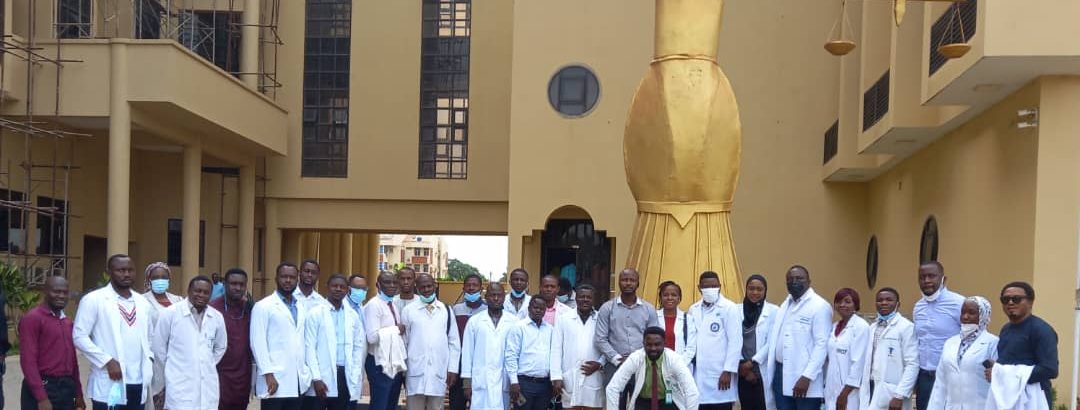Following the appointment of a medical rehabilitation therapist as the Commissioner of health in Abia state; a lawyer was also appointed the Commissioner of health in Osun state.
Despite the all-round change in governance happening across the nation, these recent occurrences and many more issues peculiar to the Nigerian healthcare sector, are mostly defined by the Leadership of the country and the sector.
Hence, our correspondent reached out to various healthcare professionals across different sectors in the nation, to hear their opinions and projections about this occurrence of “disruptive” leadership in the healthcare sector.
Medical Mirror Correspondent: Recently, a lawyer was appointed the Commissioner of health in Osun state, asides the medical rehabilitation therapist in Abia state a while back. What are your thoughts on these occurrences and their possible impact on the healthcare system?
From the NMA Lagos platform, different cadre of doctors had different perspectives. One of the medical elders said, “in my opinion, at the level of commissioner; administrative and leadership skills are more important than technical skills”. Supporting his statement with the rhetoric question, “Is the Commissioner going to treat patients or perform surgery?”.
However, some other doctors argued this point, cross-questioning that “Does the lawyer have these skills more than any other? Can we make a doctor the Accountant-General of the Federation (AGF) or commissioner for finance? Or did he appoint a medical doctor as the Commissioner for Justice? Is there no medical or health professional with administrative and technical skills, worthy of becoming a health commissioner in Osun State? What happened to putting square pegs in circular holes?”. Further expounding that, “In as much as leadership, admin and technical skills are important, there is no way on earth someone with the required quality and capability to deliver in the health field (i.e., a lab scientist, nurse, doctor, pharmacist etc) would be absent in the entire Osun state. Except it’s “payback time for success” and this shows that we do not have regard for merit in our own country.
Likewise, another doctor reacted to an initial inquiry of “Is the Commissioner going to treat patients or perform surgery”. His response was, “Yes! Because he will have to understand the challenges within the system to tackle it effectively. Beyond treating patients or performing operations, he (the commissioner) needs to have a good understanding of the basics and principles of healthcare; before he can be the leader or coordinator of the healthcare team to get the desired outcomes. Otherwise, one day, the Chief Air Hostess, will be appointed as a pilot, and we will have lawyers, engineers, nurses etc as Chief Medical Directors (CMDs) and Head of Departments (HODs) of various clinical speciality departments. Or we appoint a tailor to build our roads and a driver to sew our dresses. Which largely show we celebrate mediocrity across board as a nation”.
Although, another doctor weighed in a different opinion, postulating that the plan of the Osun state governor might be to synergize “Health and Law”; hence the lawyer being appointed to oversee the state’s ministry of Health (SMOH). But also bring to fore that people not primarily trained to function within a sector, might find it difficult to deliver with “sterling achievements” from their tenures. As well mentioning the case of Chris Ngige as a Minister of Labour and Employment.
Additionally on qualifications and people fitting into positions different from their primary field of expertise, another doctor was of the opinion that “it depends on what other qualifications they have. For instance, if a doctor has both qualifications as a doctor and a financial expert, then he can occupy that position of the AGF”. Citing the case of a medical doctor who later went to study law, became a lawyer and was called to bar.
Moving across sector, a Health System Strengthening expert (Dr Emmanuel Fatunsin), who has worked in different health management capacity across the southern, western and northern part of Nigeria, also emphasised that “Square pegs in round holes? It won’t just work”. Elucidating that, “I don’t object to anyone within the health workforce or healthcare space becoming a commissioner. Really, it doesn’t have to be a doctor, but what experience does a lawyer have in Health System Strengthening and rendering of Quality Health Services? How will he be able to make good and effective decisions as it concerns health services and implementation in the State? Does he even know what or which department or parastatal is responsible for what and which in the SMOH?”
Asides from different medical professionals in the public health sector and government parastatals passionately reiterating that, “Square pegs or triangular, cannot perfectly in a round hole”; a medical laboratory scientist (MLS Jerry Dim) also shared his view, stating that “if the appointed commissioner is sound administratively, I see no issues. It doesn’t have to be a doctor in my opinion”.
Likewise, speaking with a National Association of Nigeria Nurses and Midwives (NANNM) Chairman in Osun state (Mr Olawale Ajayi), he had a lot to say concerning this issue; starting from the history of commissioners and ministers appointed for the ministries of health from inception till date across the country with their various outcomes. Pointing out that before the era of appointed Chief Medical Directors (CMDs) and Commissioners, what was obtainable were “Hospital Administrators” (which could be anybody – whether a medical professional or not – qualified for that position). Further revealing that having only medical doctors in those positions from inception, was as a result of regimented agreement with military backing, during the Ibrahim Babangida regime and Prof Olikoye Ransome Kuti tenure as minister of health – which could also be based on their cordial relationship as friends. As well highlighting that apart from the effective health reforms and good healthcare outcomes observed during that tenure, only Professor Eyitayo Lambo – who happens not to be a medical doctor, but a health economist, and was appointed as minister of health during the Obasanjo regime – has been able to achieve similar feat within the Nigeria health sector. Recounting the ineptitude – especially in leadership and managerial aspect – of most medical doctors that have occupied these positions and the unimpressive health indices associated with their tenures.
On the issue of impact, Mr Olawale Ajayi stated, “It could have its positives and back lash. Usually, the backlash would stem from our medical colleagues – the physicians who would feel slighted or feel that their territory is being impeded upon by supposedly outsiders. However, beyond that, I see more of the positives, because we are going to have relative peace with a higher “sense of belonging” and “fair play” within the healthcare industry. And I see change to the current structure of our rigid healthcare system, where virtually every position is occupied by the medics – depriving other professionals the opportunity of bringing in new innovations. Innovations that are way beyond medicine but can apply to our various fields. With this, I believe we are going to see a better and more harmonious healthcare industry, with possibly better health indices. Because, in my opinion, now we have somebody who has a global understanding – and not just an understanding narrowed to the healthcare industry – superintending over the ministry”.
Conclusively, during the panel discussion on “the role of sustainable leadership and efficient resources mobilisation in improving health” at the Lagos Health Summit 4.0; Dr Richardson Ajayi summarised the outcomes of a leadership and managerial survey carried out among health organisations led by different medical and non-medical professionals. The result showed that the best effectively and efficiently ran organisations were those led by medical doctors who had managerial training, the next best were those led by non-medical doctors that had managerial training, while the least effectively and efficiently ran organisations were those led by medical doctors without managerial training.
All in all, we at Medical Mirror wish the appointees successful tenures with great achievements in all their endeavours towards the development of their states and the Nigerian health sector as a whole.
About Author:
Mary Oluwakemisola Agoyi is a medical doctor with a background in journalism and vast experience in global health research, academic writing, and content creation. With over 7 years’ experience in writing, reporting, editing, managing and contributing on various national and international medical/health-related publication committees, platforms and organisations; She believe that proper medical documentation and communication across all levels and sectors is key for sustainable development in the health sector and beyond.





Discussion1 Comment
Pingback: We are all potential patients… Everybody must come together towards quality patient-centred care provision” – PT Adejugbagbe, National PRO 1, NSP